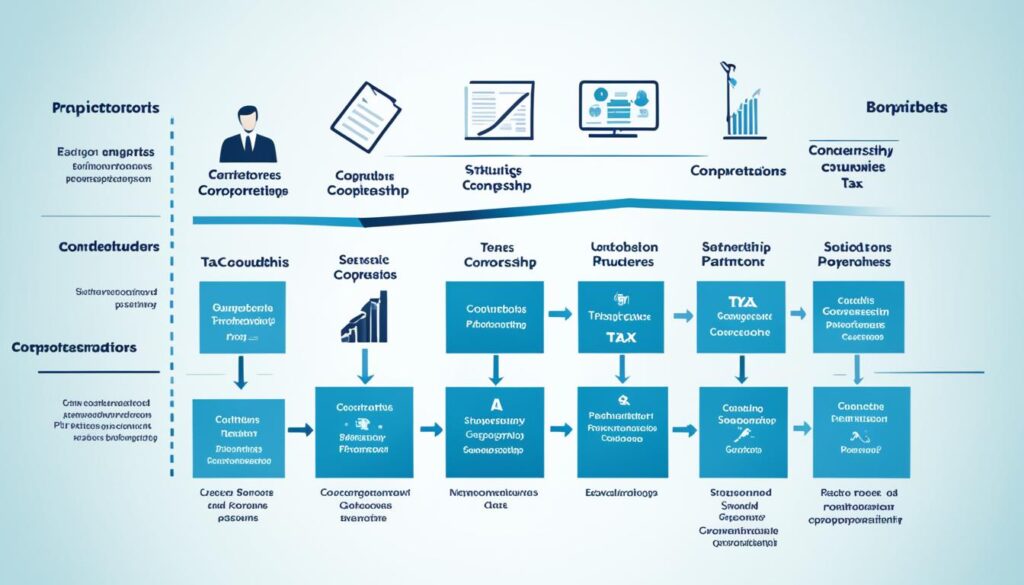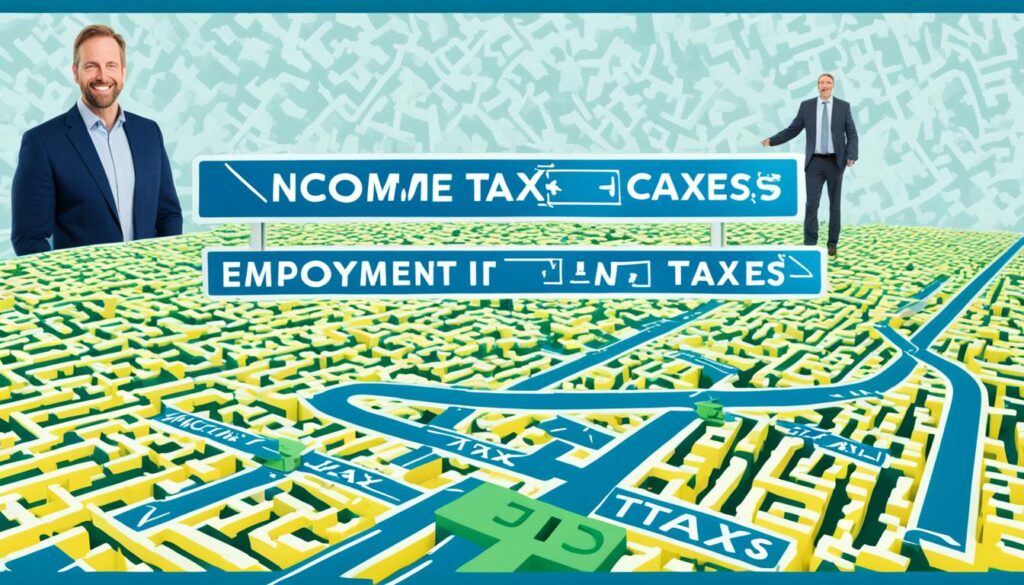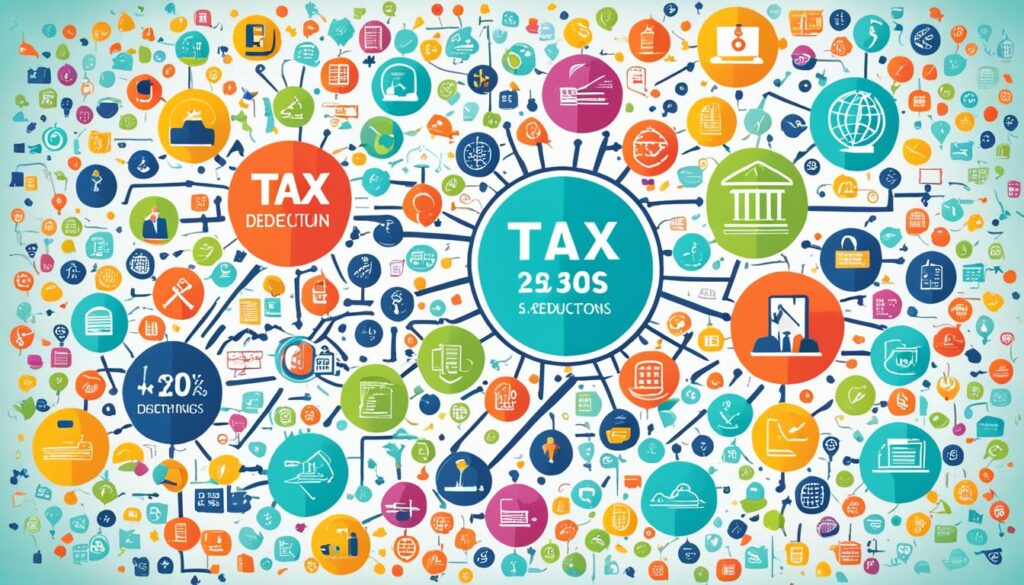Do you know the effect your business structure has on taxes? The choice goes beyond legal setup and liability. Each business structure brings its own tax challenges and opportunities. Knowing these can lead to big savings. Whether you’re a small business or a large company, understanding your structure’s tax impact is key.
Let’s dive into how different business structures, like sole proprietorships, partnerships, LLCs, and corporations, influence taxes. We’ll look at the pros and cons tax-wise for each. You’ll learn about tax planning and discover deductions that could benefit your business. If you want to better manage your business taxes and make smart tax moves, keep reading!

Key Takeaways:
- Different business structures have varying tax implications that can impact the amount of taxes you pay.
- It is crucial to understand how different business structures affect your tax obligations to make informed decisions.
- Pass-through entities, such as sole proprietorships, partnerships, and S corporations, avoid double taxation.
- LLCs provide personal liability protection and flexibility in tax treatment.
- Corporations are separate legal entities subject to corporate income tax but offer limited personal liability.
Understanding Business Structures and Taxation
A business structure is the legal setup of a company. It is key in defining who owns the business, limiting personal risks, and handling taxes for growth. Picking the right structure helps owners legally define their business as its entity with benefits. It’s wise to register the business and get advice from experts. This ensures you choose a structure that meets your long-term needs.
When picking a business structure, think about the legal organization, ownership rights, and personal liability. Also, consider how it will manage business taxes and allow for future growth. Entities like partnerships, sole proprietorships, corporations, and LLCs each have their own pros and cons. They influence how the business fits into the legal world.
Ownership and Personal Liability
The structure you choose impacts ownership rights and personal liability. Sole proprietorships, for example, give the owner full control and risk. This means the owner’s personal assets could be at risk. Partnerships share both ownership and risks among partners. Meanwhile, corporations and LLCs separate the business from its owners. This offers limited personal liability protection.
Business Taxes and Future Growth
Different structures also mean different business taxes and effects on future growth. Tax duties and rates can vary. For instance, S corporations and partnerships pass profits and losses to the owners’ tax returns. Corporations face corporate income tax, affecting overall taxes.
Considering how a structure supports future growth is vital. Structures like corporations are better for getting investments or capital. But, sole proprietorships or partnerships could limit growth due to funding challenges.
Choosing the right structure is crucial for legal, financial, and operational success. Legal or tax advice is recommended to get the most from your decision.
| Business Structure | Ownership | Personal Liability | Business Taxes | Future Growth |
|---|---|---|---|---|
| Sole Proprietorship | Single owner | Unlimited personal liability | Reported on owner’s personal tax return | Potential limitations due to lack of external funding |
| Partnership | Multiple owners | Shared liability among partners | Reported on partners’ personal tax returns | Growth potential dependent on partners’ contributions |
| Corporation | Shareholders | Limited personal liability | May be subject to corporate income tax | Potential for growth through external investments |
| LLC | Members | Limited personal liability | Can be treated as a pass-through entity or separate tax entity | Flexible growth potential with legal protection |
Sole Proprietorship and Tax Implications
A sole proprietorship is the most common type of business structure. It sees the owner and the business as one legal entity. You are on the hook for the business’s debts and must pay taxes on all earnings.
Being a sole proprietor means your business profits and losses go on your personal tax return. This setup makes tax filing simpler since you don’t need a separate business tax return.
Sole proprietors must pay self-employment tax. This covers both employer and employee parts of Social Security and Medicare taxes. This cost can be quite high for many business owners.
It’s wise to talk to a tax expert or accountant about sole proprietorship taxes. They can explain self-employment tax and help with filing. They also offer tips to lower your taxes.

Choosing a sole proprietorship involves balancing simplicity and control with financial and legal responsibilities. Speak with a professional to see if it’s right for you. They can guide you in picking the best business structure based on your needs.
Partnership Structures and Tax Liabilities
In the business world, partnerships are a common choice. They let entrepreneurs and pros work together. A partnership is a business where two or more people join to form a legal entity. The owners, called partners, share profits, losses, and management.
There are different kinds of partnerships, and each has its own tax impacts:
- General Partnership: This is a widely chosen type. Here, all partners share equal rights and duties. Every partner is also personally liable for any debts.
- Limited Partnership: This kind splits partners into two groups: general and limited partners. General partners control and are fully liable. Limited partners have less liability and don’t manage the business.
- Limited Liability Partnership (LLP): An LLP is like a mix of partnerships and corporations. It gives partners limited liability. This means their personal stuff is protected from business debts.
Partnerships don’t pay income taxes themselves. Instead, profits and losses go through to the partners. They report these on their personal tax returns.
Example: Imagine John and Lisa are in a general partnership. The business earned $100,000 in profit. They each report $50,000 of this profit on their tax returns.
Even though partnerships are flexible, personal liability is a big deal. Partners are personally responsible for the business’s debts.
Partnerships have to meet certain tax responsibilities. They must file an annual return with the IRS, using Form 1065. This shows the income, deductions, and distributions. Each partner also gets a Schedule K-1. It shows their share of income, deductions, and credits.

Limited Liability Company (LLC) and Tax Benefits
An LLC is a combination of personal liability protection and tax perks. Many businesses choose it for its flexibility and tax benefits.
Owners of an LLC aren’t personally responsible for the company’s debts and obligations. This means their personal assets are safe if the company faces legal or financial problems. This is a major advantage over sole proprietorships and partnerships, where personal assets could be at risk.
On the tax side, an LLC can be seen as a pass-through entity or its own tax entity. As a pass-through entity, the profits and losses go directly to the owners’ tax returns. This setup means the LLC doesn’t pay its own taxes. Instead, the owners report their portion of income and losses.
There are several benefits to pass-through taxation. It simplifies tax filing as the LLC doesn’t file separately. It also lets owners reduce their personal taxes with LLC losses. Plus, it avoids the double taxation that corporations face.
If an LLC opts to be taxed like a corporation, it pays corporate income taxes. This option is less popular and usually picked by larger LLCs wanting to keep profits within.
It’s crucial to know that LLC tax rules can differ by state. Before choosing this structure, consider the rules carefully. It’s wise to talk to a tax or legal expert to get it right and understand the benefits and rules of an LLC.

Key tax benefits of an LLC include:
- Pass-through taxation: LLC profits and losses go on the owners’ personal tax returns, which avoids double taxation.
- Personal liability protection: Business debts and obligations can’t touch the owners’ personal assets.
- Flexibility in management: LLCs face fewer rules than corporations, offering more flexibility in how they’re run.
- Tax-planning opportunities: Owners can use strategies to lower their taxes, like deducting expenses and using retirement plans.
In summary, choosing an LLC can bring big tax benefits, such as pass-through taxation, protecting personal assets, and management flexibility. Understanding your state’s specific rules for LLCs is key. Seeking professional advice ensures compliance and maximizes the advantages of this structure.
Understanding Corporation Structures and Taxation
A corporation is a separate legal entity from its owners, known as shareholders. It provides limited liability for them. This shields their personal assets from business debts. This feature is seen as a benefit for those looking at corporate structures. There are two main kinds of corporations: C corporations and S corporations.
C Corporations:
C corporations are very common. They face corporate income tax, which means profits are taxed at the corporate level. When profits are given to shareholders as dividends, they get taxed again. This happens at the individual’s tax level. This double taxation can be seen as a downside. Yet, C corporations can put profits back into the company. This can help the company grow.
S Corporations:
S corporations are different because they are pass-through entities. Their profits and losses go directly to the shareholders’ personal taxes. This way, they blend a corporation’s liability protection with the tax perks of a partnership or LLC. Thus, S corporation shareholders don’t face double taxation, unlike C corporation shareholders.
Both C and S corporations are considered separate legal entities. The corporation itself is responsible for any business debts or liabilities, not the shareholders. This legal separation offers more protection to shareholders if there’s a legal battle or money issues.

| C Corporation | S Corporation | |
|---|---|---|
| Taxation | Taxed at the corporate level and again at the individual level when profits are distributed as dividends. | Profits and losses pass through to shareholders’ personal tax returns, avoiding double taxation. |
| Personal Liability | Owners have limited personal liability, protecting personal assets from business debts. | Owners have limited personal liability, protecting personal assets from business debts. |
| Legal Entity | The corporation is a separate legal entity from its owners. | The corporation is a separate legal entity from its owners. |
Deciding between a C corporation and an S corporation depends on many things. This includes tax preferences, business size and structure, and owner goals. Talking to tax and legal experts is wise. They can help business owners decide wisely and meet all legal and tax rules.
Tax Considerations for Different Business Structures
Choosing the right business structure is crucial due to tax effects. Each structure has its own tax needs for income and employment taxes. Knowing this can guide you to smart decisions and better tax plans.
Sole Proprietorships, Partnerships, and S Corporations
Sole proprietorships, partnerships, and S corporations have tax benefits. Their profits go directly to owners’ tax statements. This avoids the double taxation seen in other structures.
But, self-employment taxes are a big deal for those who work for themselves. These taxes cover Social Security and Medicare. Owners must pay self-employment taxes on their business income.
Corporations and Double Taxation
Corporations face corporate income tax as they are separate entities. Their earnings, once given to shareholders, are taxed again. This double taxation means income is taxed twice.
Yet, corporations offer limited liability. This protects owners’ personal assets from business debts.
Employment Taxes
All business types must handle employment taxes if they have employees. They need to withhold and pay taxes like Social Security and Medicare. Federal and state taxes must also be handled where needed.
Corporations must also watch how they categorize their workers. The IRS has rules to decide if workers are employees or contractors. Wrong classification can lead to penalties.
It’s smart to talk with tax experts and keep up with tax laws. This ensures you meet employment tax rules.

Tax Planning Strategies for Different Business Structures
Tax planning is vital for handling your business’s taxes. Different structures mean different strategies to cut tax costs. Think about using business deductions and credits, setting up retirement plans, and handling capital gains and losses. Also, consider how you pay your team.
Business Deductions and Credits
Lowering your taxes starts with using business deductions and credits. Deductions lower how much income gets taxed. Credits cut down your taxes directly. Always keep track of your costs and talk to a tax expert. They help you catch every saving.
Retirement Plans
Retirement plans are good for you and your business. Plans like 401(k) and SEP IRAs bring tax breaks now. They also prepare you for the future. Talk to someone who knows about retirement plans to pick the right one.
Capital Gains and Losses
Dealing with gains and losses from your assets matters too. Selling something that’s grown in value can balance out gains with losses. This lowers your taxes. Still, it’s tricky, so get advice from a tax expert to do it right.
Compensation Packages
Paying your team wisely can save taxes. Things like stock options or profit-sharing are taxed differently. Changing up salaries, bonuses, and benefits is smart. Make sure to get guidance from a tax or HR expert to stay within the law.

| Strategy | Description |
|---|---|
| Business Deductions and Credits | Maximize your eligibility for deductions and credits to reduce taxable income and tax liability. |
| Retirement Plans | Implement retirement plans that provide tax benefits for both your business and personal finances. |
| Capital Gains and Losses | Manage your capital gains and losses effectively to offset taxable income. |
| Compensation Packages | Structure compensation packages to optimize your tax situation while attracting and retaining talent. |
Small Business Tax Deductions and Benefits
If you own a small business, you might get many tax deductions and benefits. These can lessen your taxes and help your business save money. Some key deductions and benefits are vital to know:
1. Business Expenses Deductions
Deducting business expenses is a big deal for small businesses. You can deduct costs like rent, office supplies, and travel connected to your business. This lowers your taxable income and your taxes.
2. Section 179 Deduction
The Section 179 deduction helps small businesses buy new equipment. You can deduct the entire cost of certain purchases, up to a limit. This is great for buying things like machines or vehicles. It gives you an immediate tax break, instead of spreading it over years.
3. Home Office Deduction
If your business is in your home, check out the home office deduction. You can deduct parts of your home expenses, like mortgage interest and utilities, related to your home office. Your home office must be only for business to qualify.
4. Business Vehicle Deduction
Using a vehicle for business? You can deduct costs like fuel and maintenance. There are two ways: the actual expense method and the standard mileage rate method. You choose the method that saves you the most on taxes.
Using these tax deductions and benefits can reduce your taxes and increase your business’s earnings. Make sure you meet all the requirements for each deduction. A tax expert can help you get the most savings while following tax rules.

“Utilizing small business tax deductions is key to your business’s financial health and growth. Knowing about these deductions helps you plan your taxes better.”
Tax Implications of Business Structure Changes
Changing your business structure can change how much tax you pay. This is because different structures, like moving from a sole proprietorship to an LLC, have different tax rules. It’s important to know these rules. Getting advice from tax experts ensures you follow IRS rules and avoid problems.
IRS rules change based on your business’s new structure. For instance, turning your business into an LLC requires Form 8832. This form decides how the IRS will tax your LLC. Changing from a partnership to a corporation means filing Form 8832 and Form 2553. Form 2553 asks for S corporation status.
Changing your business structure affects taxes in ways like:
- Tax consequences: A new structure can alter what you owe in taxes. This includes different tax rates and what deductions or credits you can claim. Understanding these impacts is key for your finances.
- Legal requirements: Each structure has unique IRS rules. Following these rules is crucial to avoid fines or audits. Tax professionals can explain these rules, ensuring you meet IRS standards.
- Recordkeeping: Switching structures means updating financial records and how you keep them. Good records are important for tax filing and audits.
“Understanding the tax consequences of changing your business structure is essential to make informed decisions and optimize your financial outcomes.” – [Tax Professional Name]
Getting advice from tax experts helps plan your structure change with less tax impact. They know how to navigate IRS regulations, helping your business benefit the most.
Example Table (Tax Consequences Comparison)
| Business Structure | Tax Consequences | IRS Requirements |
|---|---|---|
| Sole Proprietorship | Paying self-employment taxes; personal liability | No formal filing requirements |
| Partnership | Pass-through taxation; joint and several liability | File partnership tax return (Form 1065) |
| LLC | Flexible tax treatment; limited liability | File appropriate tax elections/forms (e.g., Form 8832) |
| Corporation | C-corporation: Double taxation; limited liability. S-corporation: Pass-through taxation; limited liability | File Articles of Incorporation and additional tax forms (e.g., Form 2553 for S-corporation election) |
Talk to tax experts to understand your specific situation. They can assess how a structure change impacts your taxes and IRS requirements. This helps make choices that fit your financial goals.

Seeking Professional Tax Guidance for Your Business Structure
Choosing the right business structure and managing taxes can be tough. It’s a good idea to get professional tax guidance from experts. Tax professionals or legal professionals in business taxes can help a lot. They offer great advice on tax planning strategies, explain tax rules, and make sure you follow IRS regulations.
Experienced tax advisors can save you both time and money. They know a lot about tax rules for different business types. By working with them, you can use their knowledge to make smart tax decisions for your business.
A tax expert can find tax breaks, credits, and bonuses for your type of business. They’ll help you get all the tax perks you can, while keeping your taxes low legally.